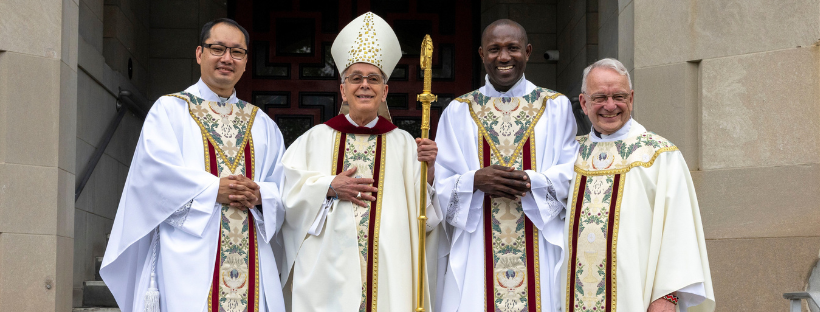Our Gospel today and the Gospel of next Sunday together form an integral section of Jesus’ profound Sermon on the Mount. It is commonly called Jesus’ “six antitheses.” We know that an “antithesis” is an alternate assertion different from the original “thesis.” Thus, Jesus is giving a new, more profound interpretation of six basic elements of Jewish law.
Jesus makes a pivotal statement; he asserts: “Do not think that I have come to abolish the Law or the Prophets; I have not come to abolish but to fulfill them” (Mt 5:17). Indeed, Jesus is not doing away with the Mosaic Laws found in the Old Testament; he is completing them, giving them a new and profound interpretation.
An Original Perspective. Following his purpose in reinterpreting the commandments, Jesus goes on to describe six concrete ways in which his new law supersedes the old law. He uses a standard way of speaking: “You have heard how it was said [in the old law]; however, I say to you….” He first quotes the Mosaic injunction, then proceeds to give it a new, more “radical” interpretation. Note that the Mosaic Law remains valid; however, as a Christian follower of Jesus, we must go deeper in fulfilling the demands of the law. It is not enough just to follow the external demands of the law; we must fulfill them wholeheartedly—with renewed motivation.
Reinterpretation. Allow me to paraphrase each of the six antitheses: (1) Moses said: “Do not murder.” Jesus says: “Do not hate anyone or even be angry with another.” (2) Moses said: “Do not commit adultery.” Jesus says: “Avoid all lustful thoughts and illicit desires.” (3) Moses said: “If you divorce, give your spouse a divorce notice.” Jesus says: “Do not be the first to break the marriage relationship.” (4) Moses said: “Make all your oaths in Yahweh’s name.” Jesus says: “Remember that any promise is always made before God.” (5) The Mosaic Law asserted: “An eye for an eye and a tooth for a tooth.” Jesus says: “Always do good—even to those who oppose you.” (6) Moses asserted: “Love your neighbor.” Jesus says: “Love even your enemies, for that is actually what God does.” Indeed, Jesus is setting a very high moral standard for us as his disciples!
Jesus’ Claim. Jesus always says: “I say to you.” This is significant. Jesus is actually reinterpreting the God-given Mosaic Law, and he is doing it on his own authority! Who can validly reinterpret God’s law? Only God can do that. Thus, when Jesus says: “I say to you,” he is claiming to act with God’s authority, to be God himself. As Christians, we follow Jesus, because we truly believe that he is none other than God himself, incarnated in human flesh. Jesus’ teachings are profoundly challenging! Thus, we pray and strive to follow them with renewed hearts, always relying on God’s abundant grace and mercy!
James H. Kroeger, M.M.
6th Sunday in Ordinary Time
O God, in ages past
you spoke to us through Moses
and the prophets, giving us the Law
that we might walk in your ways and live
according to your truth.
Then in the fullness of time
You spoke to us in Jesus Christ,
not only writing your Law in our hearts
but sending us the Holy Spirit to give us wisdom
to recognize your will and the strength to live
it in our lives.
Beyond “Eye for an eye” you command
us to love our enemies and pray
for those who persecute us.
More than walking a mile with our adversary
You command us to walk two miles
and to the one who asks for our tunic
You command we offer our cloak as well.
But to fulfill your commands
we would need to be divine like you
and to that end you gave us
Your body and blood as food and drink
and the Holy Spirit with the power
to live your truth and so
become more like you in this life and
live with you forever in the next.
Amen.
Prayer by Father Joe Veneroso, M




